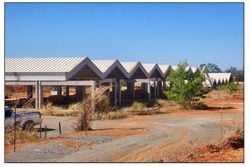A most useful series of articles by this news-paper is a vox populi feature “How the cost of living is hitting people”. Devoid of any journalistic paraphrasing, respondents’ opinions are printed ad verbatim. What comes through is a directness and honesty that should be instructive to the nation’s leaders as to what many working class citizens currently think they are going through.
Here are some excerpts: “For the last few months it has been the same cost of living because at the end of the month, your salary is the same and for a fact, every day when you go in the market, the prices keep going up. Two weeks ago pumpkin was selling for $1000 dollars in Bourda market for a slice.”
“It’s like the money goes out faster than it comes in because some days it is really, really hard for business.”
“The past few months everything have been raising due to inflation and it’s becoming impossible for Guyanese to survive on basic wages because if you are trying to survive off of the minimum wage that is currently set for both private and public sectors, it is impossible to do it on your own with one single means of income.”
“I can remember when we buy tomatoes, it was like $700 a lb; bora was like $400 a parcel for the last 3- 4 months ago.”
As discussed on several occasions a large supply side factor in these increases is external and not uniquely affecting Guyana. The good news is that relief may be in sight as global trade sorts out the mess caused by Covid-19. Natural gas prices and other commodities are all down while shipping rates from China to the USA that were close to $20,000 for a 40-ft container last year are now under US$5000.
But we won’t hold our breaths to see whether this reduction will filter down from importers to the average consumer. As for fruits and vegetables, adverse weather earlier this year is to blame to some extent although it does seem this has been compounded by price gouging by scurrilous middlemen.
The situation is that Guyana is in a rather strange predicament in that supply issues are affecting prices at the same time the oil sector is simultaneously creating demand pressures for food and housing while the government is attempting to spend far more on developmental infrastructure – although only 70% of Capex projects are expected to be completed in 2022. All this is hurting not only the working class but also savers and pensioners who are seeing incomes decline in real terms. $10M of life savings in the bank at the beginning of this year will likely be worth only $9M at the end. This can create a vicious cycle where consumers choose to spend rather than save thus driving prices up further. We are not there yet but it is time the government adequately and systemically addresses both the immediate cost of living increases on the working poor and the longer term goal of sharing the benefits of the windfall oil revenues now building up in the NRF that will probably amount to US$20B by 2027.
This mind boggling number is not made up but recorded in the IMF’s mid-year report, which at the same time encouraged the government “to further develop and strengthen a well-targeted social safety net system.”
They have made some efforts in this regard: one time payments to pensioners, the “Because We Care” grants for parents and guardians of schoolchildren and then the relief for farmers, fisherfolk, riverain residents and ex-sugar workers. A lot has been written that this is weighted towards PPP/C supporters, and there may well be some truth to that. But it is also important to understand the deep crisis in Guyana’s rural/agricultural communities that is not new but part of the decades-long mass exodus from the countryside creating hollowed out and depressed communities. They are in a very bad place not only economically but also sociologically with many citizens engaged in self destructive and often violent behaviour. This decline will likely only get worse in part because of what seems to be long-term changes to weather patterns affecting rural incomes; a couple of bad harvests and many farmers feel less inclined to plant their lands. Rice and sugar production declined by 53.1% and 47.7% for the first quarter of 2022 and reports are that there will be no improvement for the second half of the year even for rice which was once a strong contributor to GDP.
In contrast the 8.8% growth in the non-oil sector is centred on the capital and its environs and is a result of the oil sector’s demands for all manner of services. This means skilled and semi-skilled workers in sectors such as construction, hospitality and many other areas are in demand and might be enjoying higher wages.
However if we accept a special case for rural and riverain communities, the government should have done more to ensure transparency given there have been many accusations that people were fraudulently claiming grants. Ultimately there are far easier and more equitable mechanisms that can serve in the short and long term. The recent reduction in GuyOil prices for fuel is a perfect example of equitably addressing the cost of living, and the government should be applauded for forcing the other oil companies to get in line after they dragged their feet for several weeks to lower prices.
Similarly, instead of handing out cash, a simple reduction in electricity and water bills for the lowest consumers would do exactly the same thing while also rewarding those households who have legal connections. It might, if guaranteed for a long period, encourage others to regularise themselves to the extent those utilities’ revenues might even increase. This can also apply to taxes and the goal to get more citizens into the system. Raising the income tax threshold to $200,000 per month would be the equivalent of a substantial wage increase and would cut the burden on GRA to process returns that are probably not paying for themselves. Such measures would address equality and offer reliability. The practice of “one time” handouts now needs to stop because it does not address a somewhat overlooked facet of poverty – its uncertainty. Anyone who has experienced poverty will likely appreciate it is not so much the absolute lack of funds but the anxiety over one’s future income.
This can gnaw away at one’s psyche, demoralise and lead to poor behaviour such as alcohol and drug abuse that end up further harming one’s future. Hence the imperative to devise a significant and robust social safety net. Outside of a universal supplemental income for all Guyanese, there will be a very contentious debate over who should qualify for support. But as a nation we should not let perfection be an impediment to eradicating poverty. The budget is now in its planning stage and the government would do well to prioritise direct long-term support for the poorest among us.



